As a dog owner, it’s natural to expect your pet to keep their sleeping area clean, but what happens when this expectation isn’t met? If your dog is pooping in its bed, crate, or another spot where it rests, it can be both confusing and concerning. While dogs generally avoid relieving themselves where they sleep due to their instinctual cleanliness, there are several underlying reasons why this behavior might occur.
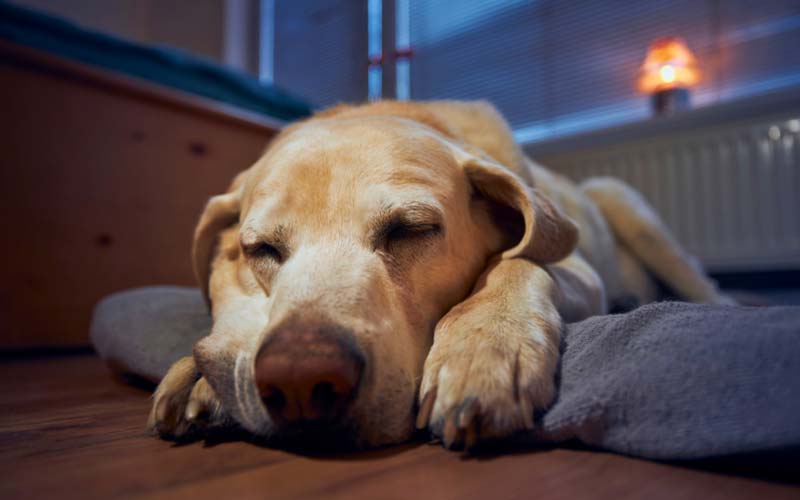
From medical conditions to training challenges or anxiety, understanding the cause is essential to solving the problem. In this article, we’ll explore why a dog may poop where it sleeps, identify potential solutions, and guide you on how to prevent this behavior in the future. Whether you’re a new pet owner dealing with a puppy or a long-time dog parent facing a sudden issue, this information will help you maintain a clean and comfortable environment for your pet.
1. Why Dogs Typically Avoid Pooping Where They Sleep
Natural Instinct
Dogs are naturally clean animals, a trait inherited from their wild ancestors. In the wild, animals that lived in dens—like wolves, from whom dogs descend—were careful to keep their living spaces clean. Pooping where they slept could attract predators, compromise the health of the group, or contaminate food sources. As a result, this instinctive cleanliness became a survival mechanism.
Even in modern domesticated dogs, this behavior persists. Most dogs instinctively avoid soiling their sleeping area, which is why it’s unusual for them to relieve themselves where they rest, unless there is a specific issue at play.
Denning Behavior in Dogs
Dogs also have a strong denning instinct, meaning they naturally seek out small, enclosed spaces to feel safe and secure. A dog’s bed, crate, or designated sleeping area becomes its personal “den.” In a dog’s mind, this is a protected, safe space—similar to how wild animals viewed their dens. This reinforces the idea that their “den” should remain clean.
When a dog views its sleeping area as a sacred space, it’s highly unlikely they’ll soil it under normal circumstances. This is why accidents in a dog’s bed or crate often signal that something is wrong, such as illness, stress, or improper training, and shouldn’t be ignored. Understanding the importance of this natural behavior helps dog owners recognize when their pet may need assistance in maintaining their clean environment.
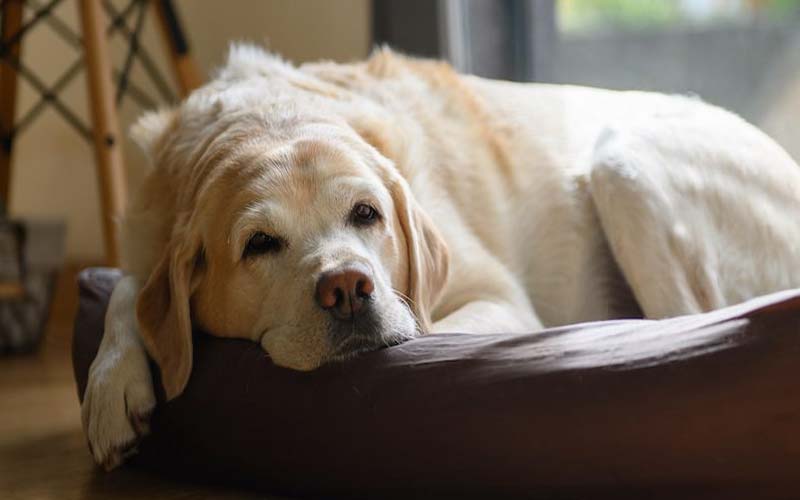
2. Common Reasons Dogs Poop Where They Sleep
Medical Conditions
One of the most common reasons a dog might poop in its sleeping area is due to a medical issue. Several health conditions can affect a dog’s ability to control its bowels:
- Digestive Issues: Conditions like diarrhea or gastrointestinal infections can cause sudden, uncontrollable bowel movements. Incontinence, where a dog cannot hold its stool, may also result from nerve damage, injury, or other underlying problems.
- Age-Related Factors: Puppies and senior dogs are more likely to have accidents. Puppies have underdeveloped control over their bladder and bowels, making it harder for them to hold it. Older dogs may experience weakening muscles or age-related conditions like cognitive dysfunction or incontinence.
- Veterinary Consultation: If your dog is persistently pooping where it sleeps, it’s crucial to consult with a veterinarian. They can rule out or treat medical conditions that might be contributing to the problem, whether it’s an infection, digestive disorder, or age-related issue.
Improper Training
Training plays a significant role in teaching dogs where it’s appropriate to relieve themselves. Improper or inconsistent training can lead to accidents:
- Puppies and Potty Training: Housebreaking can be a challenge, especially if a regular routine isn’t established. Puppies don’t inherently know where it’s appropriate to poop, and mistakes are common if they aren’t given consistent bathroom breaks.
- Crate Size and Timing: Crate training is an effective way to teach dogs not to soil their living space, but the crate must be appropriately sized. If the crate is too large, a dog may poop in one corner and sleep in another. Additionally, dogs need to be let out frequently, especially puppies, who can’t hold their bladder or bowels for long periods.
Stress or Anxiety
Emotional factors, like stress or anxiety, can also trigger accidents in dogs:
- Separation Anxiety: Dogs suffering from separation anxiety may poop when left alone, as the stress causes a loss of control. This is a common issue for dogs that struggle with being away from their owners or feel anxious in certain environments.
- Environmental Stressors: Changes in a dog’s surroundings, such as moving to a new home, loud noises, or the introduction of a new pet, can trigger anxiety and result in accidents. When stressed, dogs may revert to behaviors like pooping in inappropriate places, including their sleeping area.
Confinement for Too Long
Over-crating or leaving a dog in a confined space for an extended period without a potty break can also lead to accidents:
- Over-Crating: Dogs, especially puppies, have limited ability to hold their bladder or bowels. If they are confined for too long without a chance to relieve themselves, they may be forced to poop where they sleep.
- How to Provide Adequate Breaks: Ensuring your dog gets enough bathroom breaks throughout the day is essential. Puppies need frequent outdoor trips, sometimes every 1-2 hours, while adult dogs should be given regular chances to relieve themselves, especially if crated. Scheduling consistent outdoor time can help prevent accidents and reinforce good potty habits.
Understanding these common reasons can help dog owners pinpoint why their dog might be pooping in its sleeping area and take steps to resolve the issue.
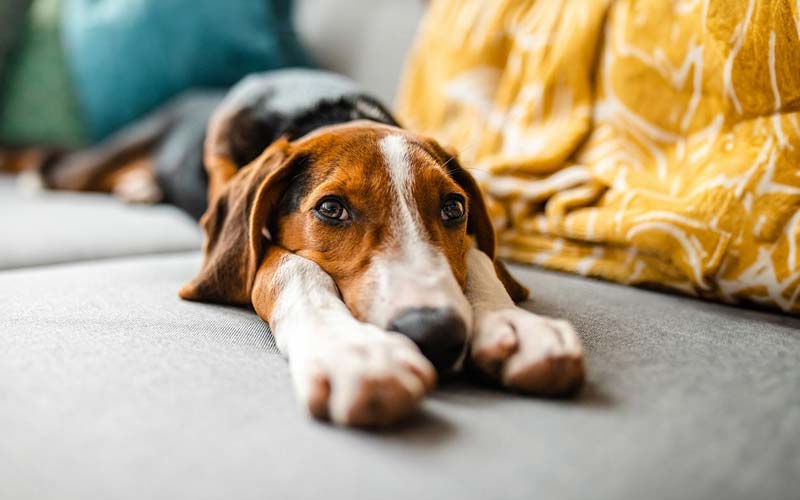
3. How to Prevent Your Dog from Pooping Where It Sleeps
Medical Solutions
Addressing any medical causes is the first step in preventing your dog from pooping where it sleeps.
- Vet Evaluation: If your dog frequently poops in its sleeping area, it’s essential to consult a veterinarian. They can help identify underlying medical conditions like incontinence, digestive disorders, or age-related problems. A vet may perform tests to diagnose issues and recommend appropriate treatment plans, such as medications or lifestyle changes.
- Special Diets: In some cases, adjusting your dog’s diet can help improve bowel control. Fiber-rich diets or specially formulated dog foods designed for sensitive stomachs can alleviate digestive problems. Your vet can recommend specific foods or supplements that promote regular, healthy bowel movements.
Training and Routine
Consistent training and a structured routine can prevent accidents and teach your dog where it’s appropriate to relieve itself.
- Consistent Potty Schedule: Establish a regular bathroom routine, especially for puppies or dogs that have recently had accidents. Take your dog out at set intervals during the day—first thing in the morning, after meals, and before bedtime. Keeping this schedule consistent helps reinforce proper bathroom habits.
- Crate Training Tips: Crate training can be an effective way to teach dogs not to soil their sleeping area. Make the crate a comfortable and positive space by providing soft bedding, toys, and treats. Avoid using the crate as punishment, and ensure your dog gets frequent breaks to go outside, especially when they’re young or still learning.
- Positive Reinforcement: Reward your dog when they relieve themselves in the correct location. Use treats, praise, or playtime immediately after they go outside to reinforce the behavior. Consistently rewarding good habits will encourage your dog to repeat them.
Managing Anxiety
For dogs whose accidents are driven by stress or anxiety, addressing the emotional root of the problem is key.
- Calming Techniques: Anxiety-reducing methods like providing a comfortable, safe crate, using calming sprays, or providing toys that help distract them can reduce stress. Anti-anxiety training programs or seeking advice from a behaviorist may also help dogs who are easily stressed.
- Addressing Separation Anxiety: Dogs with separation anxiety may benefit from gradual desensitization training, which involves slowly getting the dog used to being alone. Begin by leaving the dog alone for short periods, gradually increasing the time. Creating a calm, quiet environment during your absence can also reduce anxiety-related accidents.
Proper Crate Use
Ensuring that the crate is used correctly is essential for preventing accidents.
- Crate Size: Choose a crate that is the right size for your dog—small enough that they don’t have room to poop in one corner and sleep in another, but large enough to lie down and turn around comfortably. Dogs are less likely to soil their crate if they view it as their safe, confined den.
- Avoid Over-Crating: Don’t leave your dog in the crate for extended periods. Puppies, in particular, have limited bladder and bowel control, so they need frequent breaks. As a general rule, puppies can hold their bladder for one hour per month of age, while adult dogs should be let out every 4-6 hours.
By addressing medical issues, establishing a solid training routine, managing anxiety, and using the crate properly, you can effectively prevent your dog from pooping where it sleeps.
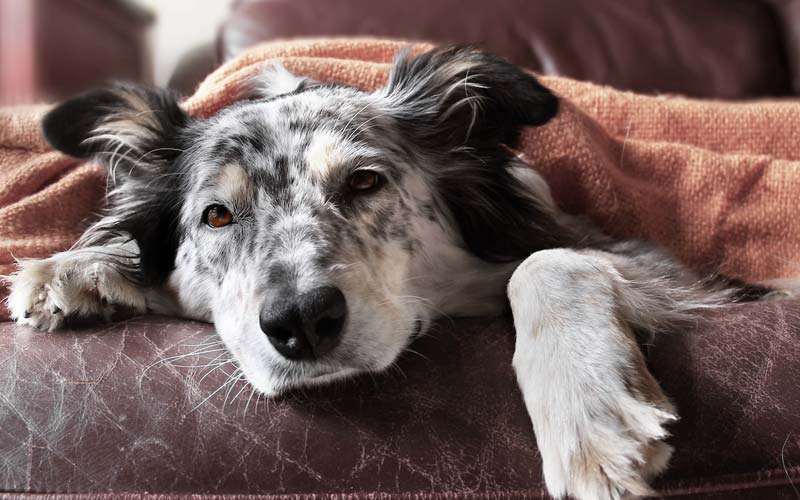
4. What to Do If Your Dog Poops in Its Sleep Area
Immediate Action
When you discover that your dog has pooped in its sleeping area, prompt and thorough cleaning is crucial to prevent recurrence.
- Clean and Sanitize: Remove any bedding or materials that were soiled and wash them with a pet-safe detergent. Use an enzymatic cleaner to remove odors from the crate or bed, as lingering smells can encourage your dog to repeat the behavior. Ensuring the area is clean and odor-free helps reinforce the idea that it’s not a bathroom space.
Avoid Punishment
It’s important to resist the urge to punish your dog for accidents, as this can lead to more issues.
- No Punishment: Punishing your dog for pooping where it sleeps can create confusion, anxiety, and fear. Dogs don’t associate punishment after the fact with the act of pooping, so they may not understand what they did wrong. In fact, punishment can worsen anxiety or stress, potentially increasing the likelihood of future accidents.
- Focus on Positive Reinforcement: Instead of punishment, focus on reinforcing good behaviors. Praise your dog when they go to the bathroom outside or in the appropriate place. Positive reinforcement strengthens the desired behavior and builds trust between you and your dog.
Behavioral Assessment
If the issue persists, take a step back and assess whether there are deeper behavioral or training issues that need to be addressed.
- Evaluate the Situation: Consider the frequency of the accidents. If they are happening regularly, it may indicate a deeper issue like stress, a lack of training, or a medical condition. Keep a log of when and where the accidents occur to help identify any patterns.
- When to Seek Help: If you’ve ruled out medical causes and tried basic training adjustments without success, it might be time to seek help from a professional dog trainer or behaviorist. They can provide targeted solutions, particularly if anxiety or improper training is at the root of the problem. In severe cases, they may recommend specialized techniques or crate training strategies to resolve the issue.
By taking the right actions immediately, avoiding punishment, and assessing your dog’s behavior, you can correct the issue and help prevent future accidents in their sleeping area.
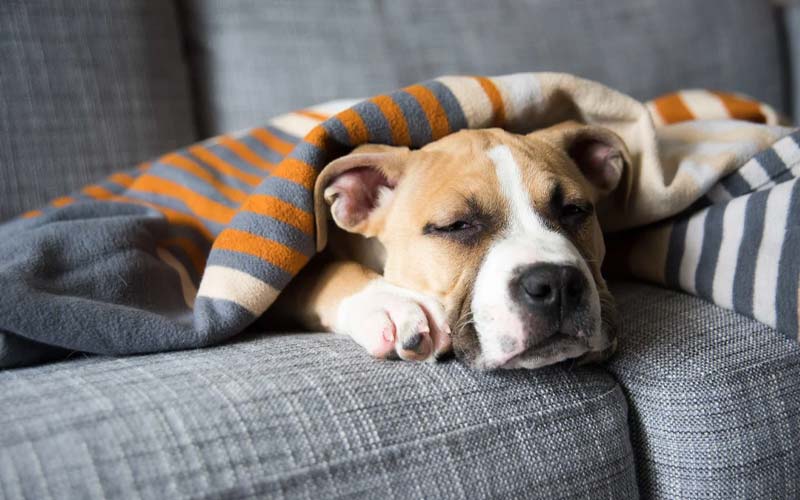
Conclusion: Will a dog poop where it sleeps?
Understanding why dogs may poop where they sleep is crucial for any dog owner facing this challenging issue. By recognizing that dogs generally avoid soiling their sleeping areas due to their natural instincts, we can appreciate the various factors that might lead to such behavior. From medical conditions and improper training to anxiety and confinement, identifying the root cause is essential for finding a solution.
To prevent your dog from pooping in its bed or crate, consider implementing a consistent potty routine, ensuring proper crate use, and addressing any underlying health concerns. Remember that punishment is not the answer; instead, focus on positive reinforcement and creating a safe, supportive environment for your dog.
If accidents persist, don’t hesitate to seek professional advice from a veterinarian or a dog trainer. Taking proactive steps can lead to a cleaner, more comfortable living space for both you and your furry friend.
Empower yourself with knowledge and take action today to resolve this issue, ensuring a happier and healthier life for your dog. Your commitment to understanding and addressing this behavior will foster a stronger bond between you and your beloved pet.